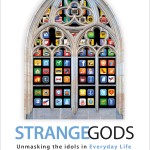He became incarnate so he might share our lot with us, and he died in order to redeem us. In Co-Workers of the Truth, Pope Benedict XVI, then Joseph Cardinal Ratzinger, put it this way:
It is obvious that God did not intend Israel to have a kingdom. The kingdom was, in fact, a result of Israel’s rebellion against God and against his prophets, a defection from the original will of God. The law was to be Israel’s king, and through the law, God himself . . . But Israel was jealous of the neighboring peoples with their powerful kings . . . Surprisingly, God yielded to Israel’s obstinacy and so devised a new kind of kingship for them. The son of David, the king, is Jesus: in him God entered humanity and espoused it to himself . . . God does not have a fixed plan that he must carry out; on the contrary, he has many different ways of finding man and even of turning his wrong ways into right ways. We can see that, for instance, in the case of Adam . . . and we see it again in all the twisted ways of history. This, then, is God’s kingship—a love that is impregnable and an inventiveness that finds man by ways that are always new . . . God’s kingship means that we have an unshakable confidence. No one has reason to fear or to capitulate. God can always be found.
If I may take a detour here—because it is important—what sort of God is this? This is the God who yields to a people who do not understand, and who—like spoiled adolescents—tell him time and time again that no, they are not patient enough, not mature enough, just too darned human to put up with doing things his way, which is the way of wisdom.
This is remarkable, almost reckless love. This is a love so all in all, so unconditional, that it is willing not just to be vulnerable, but by human standards almost foolish in its boundless, unconditional reality. What better way can we recapture our understanding of the true meaning of love than with this example? Look at the profundity of God’s love for his people, Israel, and for those of us grafted onto that branch. He gives his people something better than a king—something transcendent and eternal and incorruptible. But because they are so body bound, so captive to their senses to touch, hear, taste, and smell, they cannot see what he shows, which is everything. And so they whine, “Well, we want a king like they have over there,” and God, staggeringly, acquiesces.
God takes pity on human limitations and tries another way of teaching and reaching, a better way to know the transcendence. He says, in essence:
My love and my law are not enough? You need a corporeal king? All right then, I will come down and be your corporeal king. I will teach you what I know—that love serves, and that a king is a servant—and I will teach you how to be a servant in order to share in my kingship. In this way, we shall be one—as a husband and wife are one—as nearly as this may be possible between what is whole and holy and what is broken. For your sake, I will become broken, too, but in a way meant to render you more whole and holy, so that our love may be mutual, complete, constantly renewed, and alive. I love you so much that I will incarnate and surrender myself to you. I will enter into you (stubborn, faulty, incomplete you, adored you, the you that can never fully know me or love me back), and I will give you my whole body. I will give you all of myself unto my very blood, and then it will finally be consummated between us, and you will understand that I have been not just your God but also your lover, your espoused, your bridegroom. Come to me, and let me love you. Be my bride; accept your bridegroom and let the scent and sense of our love course over and through the whole world through the church I beget to you. I am your God; you are my people. I am your bridegroom; you are my bride. This is the great love story, the great intercourse, the great espousal, and you cannot imagine where I mean to take you, if you will only be faithful . . . as I am always faithful, because I am unchanging truth and constant love.
This God of Abraham, this king, this one who ravishes will give us anything, if we only are willing to trust the truth, even though we do not understand—have not understood since humanity first showed its instinct to hide from God, and will never fully understand—what it is his love has in mind for us, which is simply, “Olly, olly, oxen free; in my light, in my love, you need not hide.”
The strain of our brokenness, however, strands us forever in Eden, trying to manipulate truth to what we think is our advantage and—because we know we’re doing so—hiding, utterly afraid of authentic love, and, therefore, open to reasonable facsimiles and idols.
— Post excerpted from Strange Gods: Unmasking the Idols in Everyday Life 
Reposted from last year.










